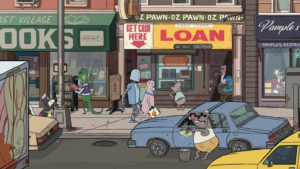Reviewed by GREG KING
Director: Billy Bob Thornton
Stars: Billy Bob Thornton, Dwight Yoakam, John Ritter, Lucas Black, Natalie Canerday, J T Walsh, Robert Duvall, James Hampton, Rick Dial, Jim Jarmusch, Christy Ward
Running Time: 135 minutes.
Actor/writer Billy Bob Thornton’s screenplays for the tense and violent thriller One False Move and the wonderful but largely ignored drama A Family Thing essentially explored themes of reconciliation with the past. Thornton makes his directorial debut with Sling Blade, a perceptive but grim tale of redemption and small town bigotry that also resonates with some brutal truths about prejudice and the problems that institutionalised people face when trying to readjust to a society that remains distrustful and suspicious. Thornton is an unobtrusive director who maintains an unhurried pace throughout this honest but down beat tale that seems to echo some of the themes of the classic To Kill A Mockingbird.
This powerful and moving drama centres around the mildly retarded but normally gentle Karl Childers (beautifully played by Thornton himself), who brutally murdered his mother and town bully twenty-five years ago. Now Karl has been declared fit to resume his place in society and is he is released from the institution that has become his home. The slow moving, slow talking Karl returns to his small home town, but finds that settling in is far from easy. He gets a job repairing lawn mowers at a small garage run by the genial Bill Cox (Rick Dial), a friend of the asylum’s administrator.
The pivotal experience for Karl comes when he makes a friend with 12 year old Frank Wheatley (Lucas Black, from American Gothic), a lonely boy who desperately needs a father, and his widowed mother Linda (Natalie Canerday), who is trying to cope with her responsibilities and the haunting memory of what happened to her husband. At Frank’s request Karl reluctantly moves into the Wheatley’s garage. While the Wheatley’s accept Karl without judgement and make him feel part of their family, Linda’s boyfriend, the volatile, drunken, brutal, intolerant redneck bully Doyle (singer Dwight Yoakam) is not so happy about the situation. Karl intuitively recognises something of his own troubled, brutal childhood and repressive upbringing in the tense atmosphere that dominates the Wheatley household. Perceiving the very real danger that Doyle represents, Karl has to confront the actions of his own troubled past and act to protect the innocent Frank.
Karl Childers is one of the most unusual characters created for an American film in quite some time, and Thornton’s emotionally felt performance is superbly judged. His deliberately halting speech, cowered posture, awkward gait and mannerisms seem thoroughly natural and unforced. Thornton imbues his flawed, simple and misunderstood character with human qualities and this is the type of assured and sympathetic performance that normally wins accolades. It is probably unfortunate that he was up against Geoffrey Rush in the Oscar race, because in any other year his superb, complex yet sympathetic performance would have won. The momentum was with Rush’s brilliant performance of tortured pianist David Helfgott, but as a consolation prize, Thornton won an Oscar for brilliantly adapting his own stage play for the screen.
In fleshing out characters partially drawn from his own experiences growing up in America’s deep south, Thornton has opted for some deliberately off beat casting choices that ultimately pay rich dividends. John Ritter (best known for his work in tv sitcoms) has an honesty and vulnerability as Vaughan, the gay supermarket manager who has also experienced the bitter bigotry and unthinking prejudice of small town America. Cast largely against type, Yoakam is a revelation as the brutal and unsympathetic Doyle, and he suffuses the character with a dangerously volatile edge that lends a palpable atmosphere of intense emotions and barely restrained violence to his scenes. Robert Duvall contributes a small cameo as Karl’s cruel and abusive father, who remains unrepentant about his actions, while cult director Jim Jarmusch crops up briefly behind the counter of a fast food restaurant. J T Walsh (from Dark Skies, etc) is eerie as the murderer Bushman, Karl’s friend at the asylum, whose cold- blooded and unrepentant demeanour offers a stark contrast to Childer’s more innately gentle manner.
There is a quiet insistence and unrelenting grimness to this ultimately moving and haunting tale, as audiences feel compelled to follow Karl Childers on his tortured path to redemption and deliverance. While it seems to chart vaguely familiar territory, Sling Blade is an original, insightful, extraordinarily haunting and poignant drama that contains an emotional punch that resonates long after the final credits roll. One of the year’s best films!
★★★★☆




